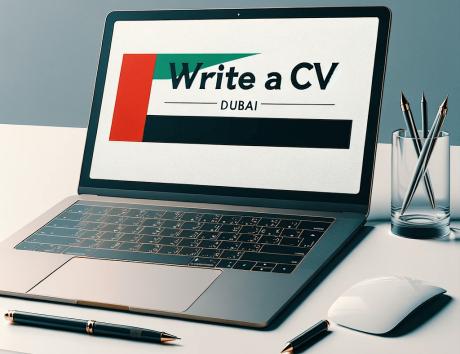How To Make a CV for a Job in Dubai
Working in Dubai offers many benefits, from tax-free income to luxury lifestyles and warm weather. As a result, the jobs market is competitive. You’re likely to be up against hundreds of applicants from all over the world. If you want to stand out from other applicants in the Dubai jobs market, spending time tailoring your CV is essential. In this article, we explain how to write a Dubai CV and some of the factors to consider when applying for jobs in this ever-popular jobs market.

Understanding Dubai's Job Market
Dubai has a developed economy with a focus on luxury retail, transport, finance, property, construction and tourism. The city is home to a wealth of multinational companies and as such, the competition for jobs can be intense. Dubai welcomes job applications from all over the world thanks to its high salaries and attractive lifestyle.
Adapting your CV for Dubai job applications and using a clear, professional structure, can make all the difference in this competitive market. Dubai employers tend to prefer a traditional CV structure with detailed descriptions of your employment history and plenty of extra details, including certifications, visa status and marital status. Take a look at the tips below to get started with your Dubai CV:
CV Length and Format Specifics for Dubai
A curriculum vitae (or CV) is a detailed account of your work experience and skills, while a resume is a short summary, usually around a page in length. In many job markets, the terms and documents have become interchangeable and indistinguishable. However, Dubai, as many other places in the Middle East, sticks to a more traditional interpretation of the CV. Employers in Dubai typically expect a CV of at least two pages, and as many as three.
The length of your CV for Dubai job applications may depend on your experience and skill set. If you don’t have extensive experience and are applying for junior roles, a CV of around two pages is likely to be acceptable. However, for more senior, professional roles, Dubai recruiters might expect you to submit a CV extending to three pages of A4.
Personal Information to Include
Personal details are the first section to include in your CV for Dubai job applications. Generally, this includes your full name, your phone number, your email address and a postal address or indication of your location.
In Dubai, there are several other pieces of personal information that employers tend to expect applicants to include. Multinational corporations might use western conventions, minimising personal information to avoid unintentional bias. Many local Dubai employers, though, expect applicants to include detailed personal information. You could include these details at the top of your CV alongside your contact information, or at the end in their own dedicated section.
Personal details to add to your Dubai CV include:
- Date of birth: some employers instigate an age range for applicants for certain roles.
- Marital status: Employers expect you to include marital status as this can affect the visa application process.
- Driving licence information: Many roles in Dubai require you to drive around the city or to other places in the UAE.
- Visa status: recruiters may want you to include your visa status, as it can be favourable to have existing permission to work in Dubai.
- Languages: You may also want to include any additional languages you speak. Dubai has an international flavour and any language can improve your prospects, particularly if you speak Arabic, Hindi or Urdu.
"Adapting your CV for Dubai job applications and using a clear, professional structure, can make all the difference in this competitive market."
Structuring Your Dubai CV
In Dubai, hiring managers expect applicants to use a traditional CV template and structure. This means emphasising your work experience before your education and skills. It’s typical to use a reverse-chronological layout. This places your most recent or current employment and education first, followed by each previous role.
The sections and order of your CV for Dubai jobs might differ depending on your experience and the role you’re applying for. However, employers in Dubai can receive hundreds of applications for each job opening, and often use application tracking systems (ATS) to review and rank CVs. As such, it’s important for your CV to follow a recognised structure. Make sure your CV includes these sections:
- Contact details
- Professional profile
- Work experience
- Educational background
- Certificates
- Skills and achievements
Professional Profile
A compelling professional profile is a critical element of your Dubai CV. It provides a brief summary of your career to date, with mention of your relevant skills and experience. A professional profile is different to a career objective, which mentions your ambitions and career goals. In Dubai, employers may favour the professional summary over the career objective. Keep your profile to two or three sentences in length to maximise its impact and catch the attention of the reader.
Work Experience
Your work experience section is the most important element of your CV for Dubai job applications. Employers expect to see a detailed summary of your job history, starting with your current role and working backwards.
In the work experience section, it’s normal to include your job title, the name and location of the organisation and the dates you worked there. For roles in Dubai, you might also want to include a brief explanation of the firm and its status. You could write, for example, “a top-10 UK law firm with expertise in employment law” or “a well-known property developer with national reach and more than 15,000 new homes built per year”.
For each entry in your work experience section, add a sentence summarising your duties, followed by up to five bullet points outlining your achievements. Employers will expect you to emphasise your achievements by including figures, metrics and milestones.
Educational Background
Your education section usually comes after your employment history. However, if you lack work experience and your qualifications are relevant to the role, you may want to add it above your job history. Include the name and level of the qualification, the institution you studied at, its location and your dates of study or graduation.
As with your work experience section, you may want to add a brief summary of the institution you studied at. This is particularly relevant if it’s a prestigious establishment or highly respected in a certain industry. You might write “a top-10 ranked UK university” or “the UK’s number one business school”.
Skills and Achievements
The skills section of your CV is a good place to demonstrate how you meet the requirements of the role set out in the job description. While this section is usually secondary to your work experience and qualifications, it can make a difference in tight recruitment calls. Make sure you only mention skills relevant to the role and try to mention specific skills only. Avoid adding generic skills like “teamwork”, “communication” or “MS Office”. You might also want to briefly summarise your career highlights and achievements in this section.
Certificates
In Dubai, employers tend to pay attention to professional certificates and qualifications. This is particularly true if it’s an international certification or if you studied at a renowned institution, or a prominent establishment in the UK or USA.
Expert Tip:
Designing Your Dubai CV
Striking the right balance with the design of your CV can make all the difference to your chances of success. In Dubai, employers tend to favour a traditional, professional layout over more creative designs. Make sure your CV has a clear structure and use clean designs that don’t clutter the page. Take a look at Jobseeker’s CV examples for inspiration.
Employers in Dubai may use ATS technology to scan and rank CVs before reviewing the best-rated CVs by eye. As such, it’s crucial to ensure your CV follows a clear structure with well-defined sections. An ATS-friendly CV makes it easier for automated systems to scan your document and identify whether you meet the job description.
Photo Guidelines
Whether to include a photo on your CV is a big decision, and one that depends on the type of job you’re applying for. While Dubai employers used to expect candidates to include a photo, this practice is becoming less common. Some customer-facing roles require a headshot, though this is usually specified in the job description. For most roles, and particularly senior positions, including a photo can make your CV appear less professional. Instead, you could include a link to your LinkedIn profile, where employers can find a photo of you if they wish to see one.
Language Use
Write your CV in English as it’s a common business language in Dubai. It’s crucial to use simple, concise language and adopt a professional tone. For senior roles, employers may expect you to use more formal language, while the tone of the document can differ from industry to industry. Make sure you also adopt a professional tone and language in your cover letter.
Finalising Your CV For Dubai
Before sending your CV, make sure you check it for spelling and grammar. Use a spellchecker and proofread your CV thoroughly, correcting any errors as you go. If your CV has numerous or serious spelling errors, it can seriously harm your chances of success. If you’re including your LinkedIn profile, make sure it matches up with that. Any inconsistencies between your CV and your LinkedIn page could undermine your prospects.
Remember, CVs in Dubai are more formal than some western countries, and often longer at up to three pages. Include detailed summaries of your work history and brief explainers of your employers and educational establishments. Make sure you include all the necessary personal information and think if it’s appropriate to include a photo.
If you’re applying for jobs in Dubai, Jobseeker’s CV examples can help you strike the right tone and design. You can also find cover letter examples and templates and resume templates to help you craft the perfect accompaniment to your CV. Sign up today to access our examples and kickstart your Dubai job search.
Impress employers with your CV
Step-by-step guidance to create a professional CV in minutes.



